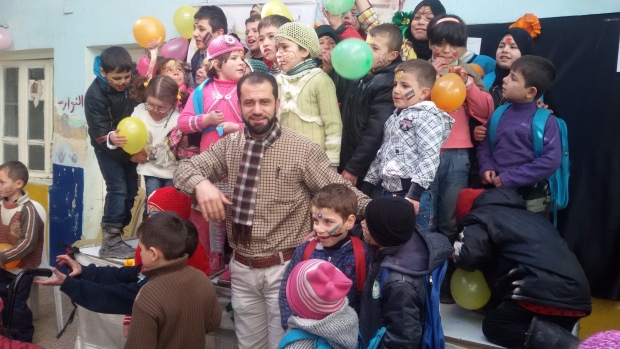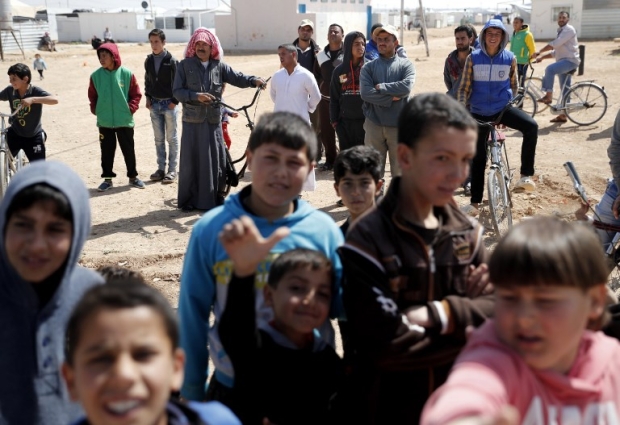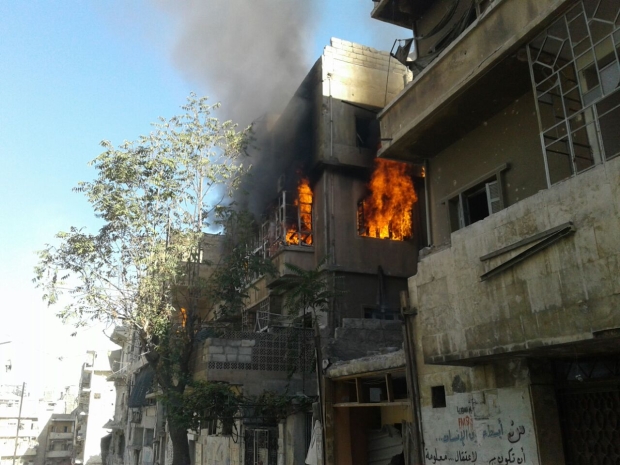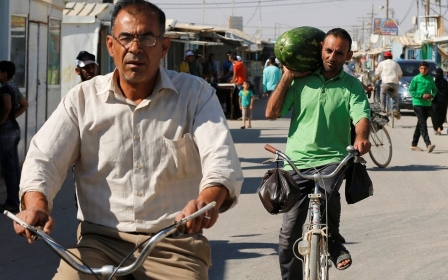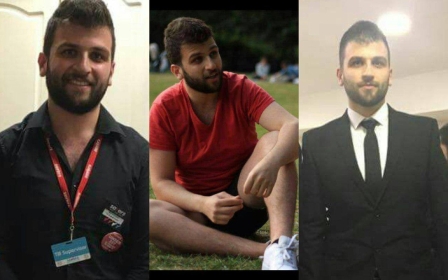Returning home, rebuilding lives: Syrians head back to their homeland
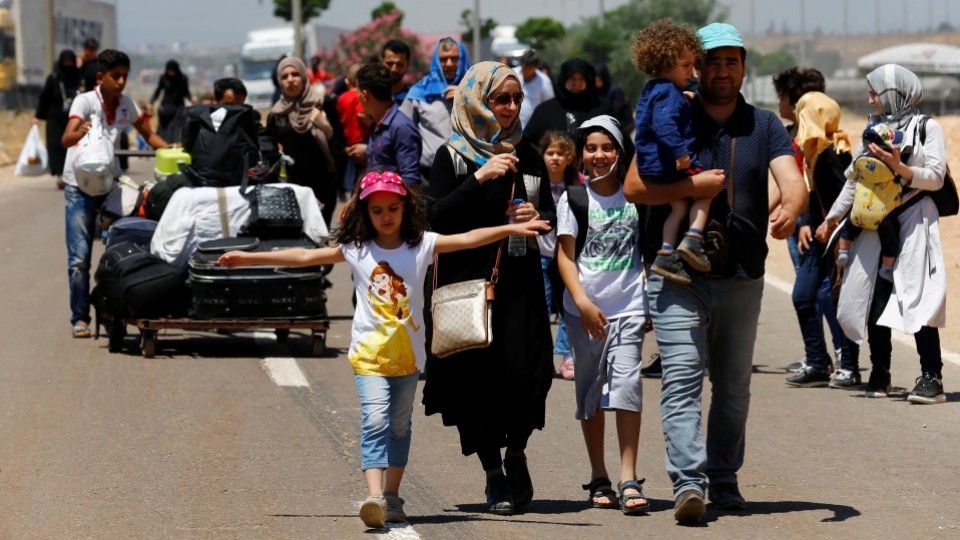
They returned home to the ruins of a destroyed town. But the sense of happiness among the Syrian refugees was undiminished.
"Despite the marks of war and destruction in every corner, there is nothing like being here again," Ashamed al-Ali, 50, told Middle East Eye as he ventured back to al-Bab in northern Syria.
Despite the marks of war and destruction in every corner, there is nothing like being here again
- Ahmed al-Ali, al-Bab
Thousands of refugees crossed into rebel-held areas of Syria from Turkey ahead of the Eid festival that marks the end of Ramadan.
Ankara has given the refugees the right to return to Turkey within a month - but many have chosen to remain despite the war and countless struggles they expect to face.
For them, nothing can compare to living back in their homeland. Ali, 50, returned with this wife and three children to al-Bab after nearly three years of living in Turkey.
But despite enjoying a sense of security and relative stability, Ali never felt settled in Turkey. Instead he became constantly pre-occupied with the thought of returning to Syria
"I began to feel hopeful when the Euphrates Shield Operation was launched and as soon as my town was liberated from IS, I began making the necessary arrangements for my journey back," said Ali, who re-entered Syria during the last week of Ramadan.
Free Syrian Army fighters, backed by Turkish jets, tanks and special forces, cleared IS from Turkey's border before launching an assault, dubbed the Euphrates Shield, on al-Bab in December. Ankara and its Syrian rebel allies retook the key city in February.
"My journey to al-Bab was filled with sheer happiness that I was finally returning to my home which I’d lived in with my wife for 14 years and to the streets and neighbourhood I’d grown up in," Ali told MEE.
Yearning to be back
Ali's story resonates with many other Syrian refugees who left Turkey to settle in al-Bab and other rebel-held districts of Syria.
According to the UN, 450,000 Syrians have returned home to areas of Syria, including 31,000 from neighbouring states so far in 2017.
"It was an indescribable feeling, breathing in the air of my homeland, the country in which I grew up and hope to die," he told MEE.
He was forced to flee as IS moved into the town in early 2014. He settled in Killis, a small Turkish town near the Syrian-Turkish border, where he took a job at a restaurant to support his family.
"I left [Syria] because I feared for my family, but I was filled with hope that I would someday return," he told MEE.
Gebaily said that although his Turkish neighbours treated him with utmost kindness and welcomed him and his family, he too never planned on staying in Turkey.
"As soon as I found the opportunity to return, I seized it," said Gebaily, who made arrangements for the journey back to Syria when he received news that IS had fled al-Bab. He crossed over when the Turkish authorities opened up the border ahead of Eid.
It was an indescribable feeling, breathing in the air of my homeland, the country in which I grew up and hope to die
- Said al-Gebaily, al-Bab
Despite returning to an overwhelming amount of damage and destruction, Gebaily was determined to rebuild his life in al-Bab.
"It has been sad to see so much lost and destroyed," said Gebaily who has since rebuilt the walls of his home and assembled new furniture for his family.
"Every day is a struggle, but I will never return to Turkey because slowly but surely things will get better here," he said.
Sense of duty
The majority of Syrian refugees returning from Turkey over the past few month longed to be home, but the return of Nezar al-Omar, 35, from Germany last year involved something more.
Omar left Aleppo in August 2015, then made his way to Munich, Germany with the help of smugglers through Turkey and Greece. He said he felt a strong sense of moral duty towards his countrymen and the resistance movement that he had been involved in from the outset.
Despite being welcomed with open arms in Germany, and finding there the peace, security and help he could never have dreamed of finding in Syria, Omar decided to return home soon after he made the gruelling journey.
"For nine months I spent in Germany, every day I followed the news. I couldn’t stand watching from afar while children were being massacred and homes were being destroyed," he told MEE.
After several months of moving from one city and refugee camp to the next, Omar finally secured a residential permit which would give him the right to live in Germany - but by then he had already decided to head home.
I felt like a traitor to my country and to the cause which I so deeply believed in
- Nezar al-Omar, 35, Idlib
So he packed his bags and travelled back through Europe using his German residential permit, then once again stared death in the face as smugglers helped him reach Syria through Turkey.
Omar returned to the outskirts of Aleppo at the peak of the months-long siege on the city late last year. He said he helped the rebel movement until a ceasefire was agreed in December 2016 and civilians were evacuated to rebel-held Idlib, where he now lives.
To Omar, his return to Syria was a matter of being faithful to his beliefs.
"Every person lives by a certain principle or belief. To give up on this belief, is to give up on life and for me this belief was Syria," he said.
Omar faced resistance and criticism from family and friends for leaving a promising life in Germany, but he is at peace with his decision. "I am struggling on every level in Syria, but at least my conscience is at peace here."
Rebuilding a homeland
According to Omar most returnees have come back to rebel-held areas where they can escape the persecution of the Assad-led government.
"The millions of us who took part in the protests know that we’d be detained and executed by the security forces if we attempted to enter government-controlled areas," said Omar, who has encouraged others to return to Syria.
Before leaving Aleppo, Omar, an Arabic teacher by profession, headed a training centre for educators in the city. But since the start of the conflict, he dedicated his time to setting up and running the only school for disabled children in the city.
His passion for the school, which he named the Arab Spring School for children with special needs, was the reason he came back.
"Even while I was in Germany, I saved money and sent it back to Syria to help keep the school running," he said.
I am struggling on every level in Syria, but at least my conscience is at peace here
- Nezar al-Omar, Idlib
Although the school he once set up was destroyed by an air strike in September 2016, Omar said he hopes to set up another one for the thousands of children who have become disabled as a result of the war.
"I remember that throughout my time in Germany, I read about the world wars and how Germans worked to rebuild their country," he said. "I feel Syria deserved the same from me."
Areeb Ullah contributed to this report.
New MEE newsletter: Jerusalem Dispatch
Sign up to get the latest insights and analysis on Israel-Palestine, alongside Turkey Unpacked and other MEE newsletters
Middle East Eye delivers independent and unrivalled coverage and analysis of the Middle East, North Africa and beyond. To learn more about republishing this content and the associated fees, please fill out this form. More about MEE can be found here.


